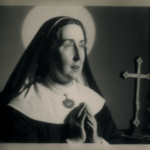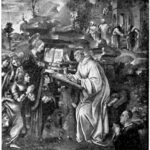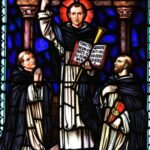St. Vincent de Paul
St. Vincent de Paul
When they lived:
St. Vincent de Paul lived during the 17th century. He was born on April 24, 1581, and passed away on September 27, 1660.
Where they lived:
St. Vincent de Paul spent the majority of his life in France. He was born in the village of Pouy in Gascony, a region in southwestern France. He later moved to Paris, where he became a prominent figure in the Catholic Church.
Notable world events during the time of their life:
- Thirty Years’ War (1618-1648): This devastating conflict, which engulfed Europe, including France, had a profound impact on the political and religious landscape of the time. It was a backdrop to much of St. Vincent de Paul’s work, as he provided relief and support to those affected by the war’s ravages.
- The Scientific Revolution: The 17th century marked a period of significant scientific advancement. Prominent figures like Galileo Galilei and Johannes Kepler were making groundbreaking discoveries in astronomy and physics during St. Vincent’s lifetime. These developments were reshaping the way people understood the natural world.
- Founding of the French Academy of Sciences (1666): Just a few years after St. Vincent de Paul’s passing, the French Academy of Sciences was founded. This institution played a crucial role in advancing scientific knowledge in France and beyond, marking the beginning of the Age of Enlightenment.
- Establishment of the Royal Society (1660): In England, the Royal Society was founded in the same year as St. Vincent de Paul’s death. This renowned scientific society was instrumental in fostering scientific research and collaboration.
- Peace of Westphalia (1648): This treaty marked the end of the Thirty Years’ War and brought significant changes to the religious landscape of Europe. It established the principle of religious tolerance and recognized the independence of various states, contributing to a more stable Europe.
Patronage:
St. Vincent de Paul is recognized as the patron saint of several causes and groups, making his legacy both diverse and impactful:
- Charitable Societies: He is the patron saint of charitable organizations and workers, highlighting his lifelong dedication to serving the poor and marginalized.
- Hospitals: St. Vincent de Paul’s work in establishing hospitals and caring for the sick has made him a patron of hospitals and healthcare workers.
- Prisoners: His advocacy for prisoners and his efforts to provide spiritual and material support to those in confinement have led to his recognition as a patron of prisoners.
- Volunteers: Given his emphasis on volunteerism and community service, he is also considered the patron saint of volunteers.
St. Vincent de Paul’s life and work spanned a tumultuous period in history, and his legacy as a compassionate and dedicated servant of the needy continues to inspire individuals and organizations worldwide.
An Enslaved Priest
Vincent de Paul was born on April 24, 1581, to a poor peasant family in the village of Pouy, France. He was taught by the Franciscans. He was doing so well that he was hired as a tutor for the children of a nearby wealthy family. He saved all his earnings to continue his formal studies at the University of Toulouse, where he studied theology.
In 1600, at the age of 19, Vincent de Paul was ordained to the priesthood. After his ordination, he remained in Toulouse for a time. In 1605, while he was on board a ship traveling from Marseilles to Narbonne, Vincent was captured by Turkish pirates. He was sold as a slave. Two years later, he and his master, whom he had converted, managed to escape and both returned to France.
Working for the Poor
Vincent went to Avignon and later to Rome to continue his studies. While he was there, he served as a chaplain to the Count of Goigny. He was also placed in charge of distributing money to the deserving poor. He also became a pastor in a small parish in Clichy for a while. At the same time, he also served as a tutor and spiritual director.
Vincent went to many places to visit and help the sick, the elderly, and the poor. However, in order to continue this mission, he realized he needed more money and more people to help all those who needed it. And so he began to ask wealthy people to donate money and distribute it to the sick and poor in his community. He was so nice and kind that the wealthy people did not mind handing him money for such a worthy cause.
From that time on, Vincent spent his life preaching missions and providing relief to the poor. He also established hospitals for them. Later on, he extended his ministry and concern to convicts. Vincent’s desire and mission to evangelize and assist the poor were so great that, with the help of St. Louise de Marillac, he founded a lay institute of women called the Daughters of Charity to help serve the poor and the neglected. He also established a religious institute of priests, the Congregation of Priests of the Mission, now known as the Vincentians.
Reforming the Clergy
Vincent also helped reform the clergy and the manner in which they were taught and prepared for the priesthood. He did this through retreats and later by helping develop a precursor to modern-day seminaries. At one point, his congregation was directing 53 major seminaries. Vincent’s retreats were open to priests and laymen and were so well attended that it was said he infused a “Christian spirit among more than 20,000 people in his last 23 years.”
On September 27, 1660, Vincent de Paul died in Paris. Pope Benedict XIII beatified him on August 13, 1729. On June 16, 1737, less than eight years later, he was canonized by Pope Clement XIII. The Bull of Canonization recognized St. Vincent de Paul for his charity and reform of the clergy, as well as for his early role in opposing Jansenism. His feast day is September 27.
Five Interesting Facts About St. Vincent de Paul
- St. Vincent de Paul is the patron of all charitable societies.
- St. Vincent de Paul’s initial intention in becoming a priest was to get an office in the Church, earn enough money to retire early, and then go home and provide for his family.
- St. Vincent de Paul was said to have a mean temper. In his prayers, he often begged God to slow his anger. His work with the poor eventually softened his heart, and he became the kind and tender pastor God desired him to be.
- St. Vincent de Paul’s heart was incorruptible. His heart and bones have been placed inside a wax figure of his body. His relics can be seen in the Church of St. Vincent de Paul in Paris.
- St. Vincent de Paul wrote more than 30,000 letters in his lifetime. Nearly 7,000 of these had been collected in the 18th century.
Prayer to St. Vincent de Paul
O God, who for the relief of the poor and the formation of the clergy endowed the Priest Saint Vincent de Paul with apostolic virtues, grant, we pray, that, afire with that same spirit, we may love what he loved and put into practice what he taught. Through our Lord Jesus Christ, your Son, who lives and reigns with you in the unity of the Holy Spirit, one God, for ever and ever Amen.



